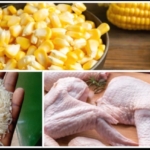
The Peasant Farmers Association has welcomed the government’s directive requiring all public schools to exclusively purchase staple food items produced in Ghana, but says the policy must be sustained by successive administrations to achieve lasting impact.
According to the Association, the move will significantly boost local production, reduce imports, and strengthen collaboration between farmers and district agricultural directorates, particularly in data collection and planning.
They stress that the directive should not be treated as a one-off initiative but must be institutionalised to support long-term food security and farmer livelihoods.
Speaking to JoyNews, President of the Association, Biamark Nortey, said effective coordination is key to ensuring the policy succeeds.
“Collaborate well with the respective Agric Directorate and the respective district. We will be able to come out together that for each district, this is the exact amount of rice we can produce if all factors are working well.
“Once we do that, we will know whether what we produce in each district is enough to feed the schools in that area. If it’s not enough, then we can determine what needs to be done to augment production,” he explained.
The Finance Minister, Cassiel Ato Forson, during the presentation of the 2026 Budget in Parliament on Thursday, announced that President John Mahama has directed all public schools, from basic to tertiary, to procure staple foods produced locally.
The initiative, dubbed “Buy Ghana, Eat Ghana”, is designed to create a reliable market for local farmers, guarantee their income, and stimulate increased domestic production.
“President Mahama has also directed all schools, from basic to secondary, to purchase rice, maize, chicken and eggs produced in Ghana only,” Dr Forson emphasised.
The directive covers a significant portion of the national food budget and is expected to influence the supply chain of thousands of educational institutions, including those under the Free SHS programme.